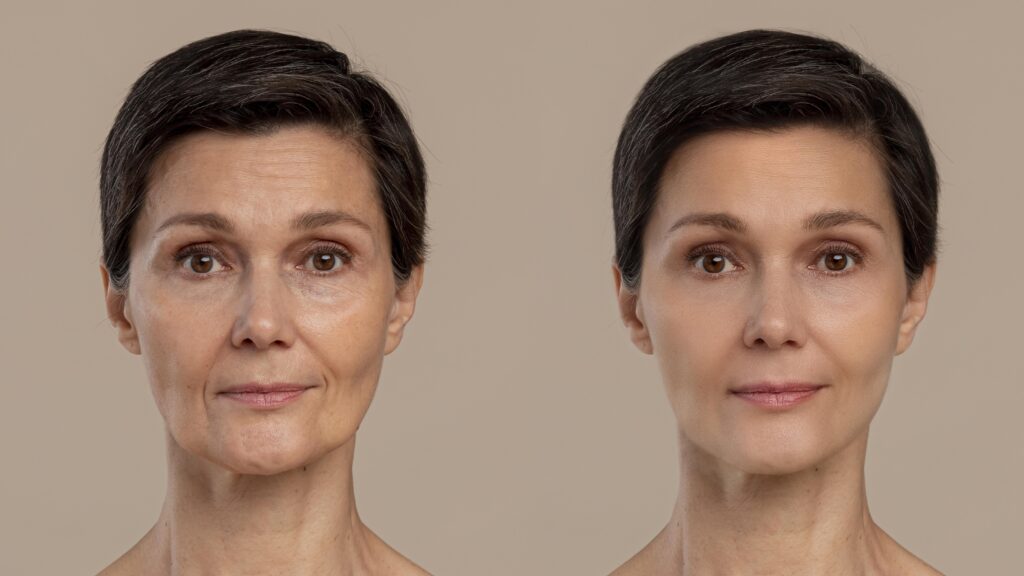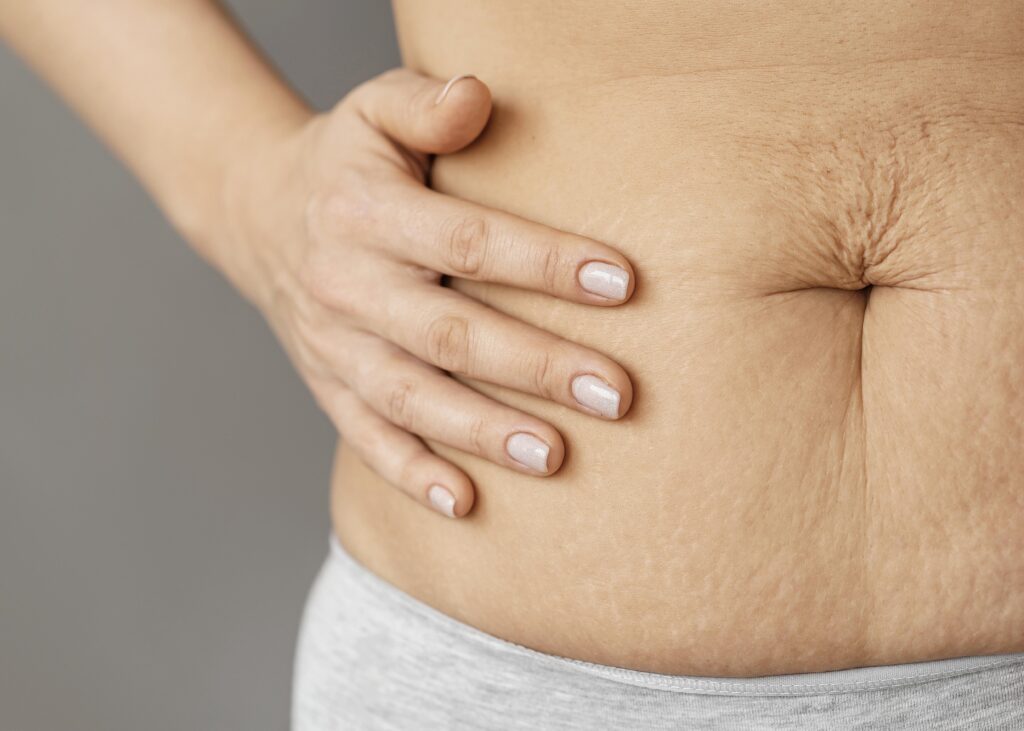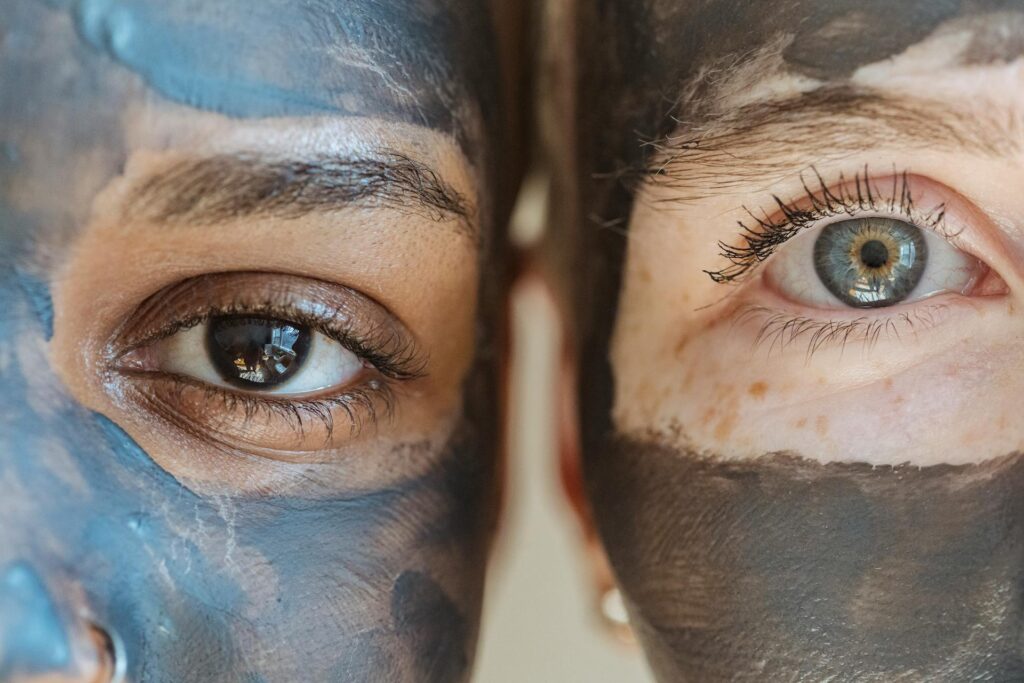
Looking in the mirror and noticing a new fine line or wrinkle? It’s a natural part of life, but that doesn’t mean you have to accept it! There are many fantastic ways to keep your skin looking youthful and radiant. This article explores how to create the best anti-aging skincare routine for you, focusing on natural ingredients and gentle practices.
We’ll break down the essential steps for a complete anti-aging routine, recommend some fantastic product options (many with natural ingredients!), and explore some lifestyle habits that can significantly benefit your skin.
Why Does My Skin Age?
There are several factors that contribute to the aging of our skin:
- Time: As we age, our skin naturally loses collagen and elastin, the proteins that give it its plumpness and elasticity. This can lead to wrinkles and sagging.
- Sun exposure: Excessive sun exposure is a major contributor to wrinkles, age spots, and uneven skin tone.
- Lifestyle habits: Smoking, dehydration, poor diet, and lack of sleep can all accelerate the aging process of your skin.
The Best Anti-Aging Skincare Routine: A Step-by-Step Guide
Here’s a breakdown of the key steps for a complete anti-aging skincare routine:
Morning Routine:
- Cleanse: Start your day with a gentle cleanser to remove any oil, sweat, or product buildup from the night before. Harsh cleansers can strip your skin of its natural oils, so opt for something mild and fragrance-free.
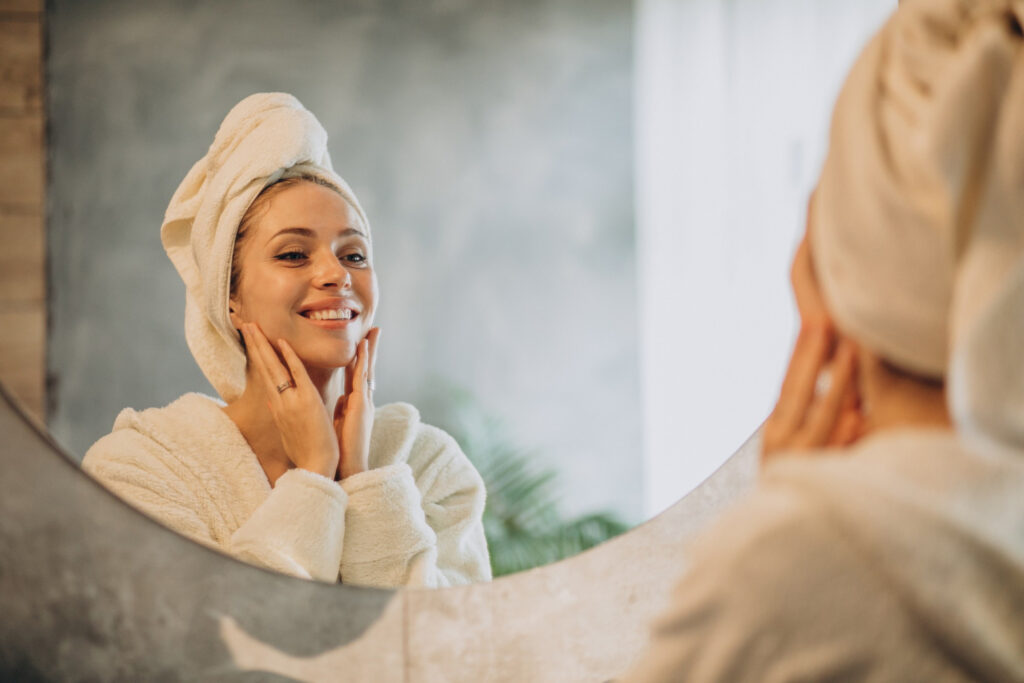
- Tone (Optional): Toners are not essential, but some people find them helpful in removing any last traces of cleanser and preparing the skin for further products. Look for alcohol-free toners with hydrating ingredients like rose water or witch hazel [Witch Hazel Benefits for Skin: Uses, Side Effects, and More: https://www.healthline.com/health/witch-hazel-benefits].
- Antioxidant Serum: Antioxidants are like tiny warriors that fight free radicals, unstable molecules that damage your skin cells and contribute to wrinkles. Look for serums with ingredients like vitamin C, green tea extract, or ferulic acid [Vitamin C Serum for Face: Benefits and Uses: https://www.healthline.com/health/beauty-skin-care/vitamin-c-serum-benefits].
- Moisturizer with SPF: Moisturizer is essential to keep your skin hydrated throughout the day. Look for a moisturizer with SPF 30 or higher to protect your skin from harmful UV rays, the leading cause of premature aging.
Also Read: Revitalize Your Skin Naturally: Discover 08 Best Homemade Toners for Dry Skin
Evening Routine:
- Cleanse: Repeat your gentle cleansing routine to remove makeup, sunscreen, and any dirt or oil that accumulated throughout the day.
- Exfoliate (1-2 times per week): Exfoliation removes dead skin cells, revealing the brighter, smoother skin underneath. However, don’t overdo it – over-exfoliation can irritate your skin. Opt for a gentle exfoliator, and limit use to 1-2 times per week.
- Treatment (Targeted products): This is where you can address specific concerns like wrinkles, dark spots, or dryness. Here are some options:
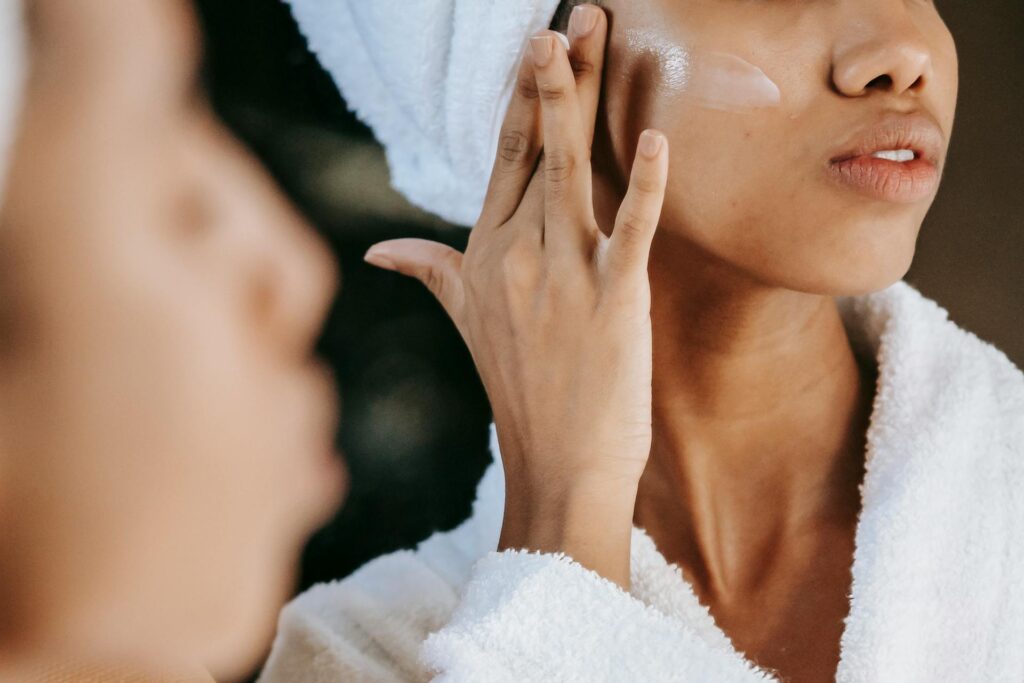
-
- Retinol Cream: This powerhouse ingredient helps stimulate collagen production and reduce wrinkles. However, retinol can be irritating for some people, so start slowly and see how your skin reacts [Retinol: https://my.clevelandclinic.org/health/treatments/23293-retinol].
- Hyaluronic Acid Serum: This hydrates your skin and plumps up wrinkles [Hyaluronic Acid: https://www.mayoclinic.org/drugs-supplements/hyaluronic-acid-injection-route/proper-use/drg-20074557?p=1].
- Night Cream: Night creams are often thicker and richer than moisturizers, providing deeper hydration while you sleep.
- Moisturizer: Finish your routine with a layer of moisturizer to lock in all the goodness from your other products.
Natural Ingredients for a Younger-Looking You!
There are many fantastic natural ingredients that can be incorporated into your anti-aging routine:
- Vitamin C: This antioxidant powerhouse fights free radicals and helps stimulate collagen production, leading to firmer, younger-looking skin [Vitamin C Serum for Face: Benefits and Uses: https://www.healthline.com/health/beauty-skin-care/vitamin-c-serum-benefits].
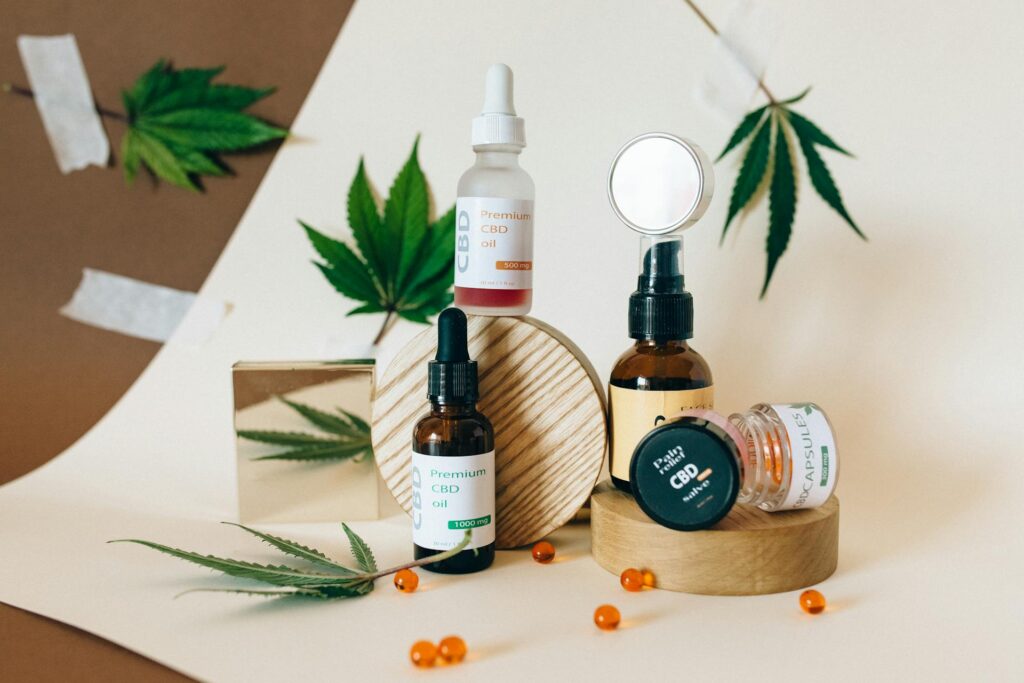
- Hyaluronic Acid: This naturally-occurring molecule attracts and holds moisture in the skin, plumping up wrinkles and keeping your skin hydrated [Hyaluronic Acid: https://www.mayoclinic.org/drugs-supplements/hyaluronic-acid-injection-route/proper-use/drg-20074557?p=1].
- Retinol (Vitamin A): A powerful ingredient that helps stimulate collagen production and reduce wrinkles. However, retinol can be irritating for some, so start slowly and see how your skin reacts [Retinol: https://my.clevelandclinic.org/health/treatments/23293-retinol].
- Green Tea Extract: Packed with antioxidants, green tea extract helps fight free radicals and may improve the overall tone and texture of your skin [Green Tea for Skin: Benefits and Uses: https://www.healthline.com/health/video/top-5-evidence-based-health-benefits-of-green-tea].
- Rosehip Oil: Rich in vitamins A and C, rosehip oil can help reduce wrinkles, scars, and hyperpigmentation (dark spots) [Rosehip Oil for Skin Care: Uses and Benefits: https://www.healthline.com/health/rosehip-oil-benefits].
- Coenzyme Q10 (CoQ10): This antioxidant naturally occurs in your skin, but levels decrease with age. CoQ10 creams may help reduce wrinkles and improve skin firmness [Coenzyme Q10 (CoQ10): Uses, Side Effects, Interactions and More: https://reference.medscape.com/drug/coq10-ibedenone-coenzyme-q10-344482].
Also Read: What is Skin Fasting and How Does It Work? | Transform Your Skincare Routine!
Remember:
- Do your research: Not all natural ingredients are right for everyone. Read about the benefits and potential side effects of any ingredient before incorporating it into your routine.
- Patch test: Before applying any new product to your entire face, do a patch test on a small area of your skin, like the inner bend of your elbow. Wait 24 hours to see if you experience any irritation.
- Consult a dermatologist: If you have any concerns about your skin or want personalized recommendations, consult with a dermatologist. They can assess your individual needs and recommend the best course of action for achieving healthy, youthful skin.
Lifestyle Habits for a Radiant You!
Taking care of your skin goes beyond what you put on it. Here are some lifestyle habits that can significantly benefit your skin and promote a more youthful appearance:
- Drink Plenty of Water: Aim for eight glasses of water daily to keep your skin hydrated from the inside out.
- Eat a Healthy Diet: Fruits, vegetables, and whole grains provide your body with the nutrients it needs for healthy skin. Limit processed foods, sugary drinks, and excessive dairy, as these can contribute to skin problems.
- Get Enough Sleep: When you’re well-rested, it shows on your face! Aim for 7-8 hours of sleep per night.
- Manage Stress: Stress can wreak havoc on your skin, triggering breakouts and accelerating the aging process. Find healthy ways to manage stress, such as yoga, meditation, or spending time in nature.
- Limit Sun Exposure: Excessive sun exposure is a major contributor to wrinkles and premature aging. Wear sunscreen with SPF 30 or higher every day, even on cloudy days. Reapply sunscreen every two hours, or more often if you’re sweating or swimming.
- Don’t Smoke: Smoking damages your skin’s elasticity and can contribute to wrinkles. If you smoke, quitting is the best thing you can do for your overall health and your skin.
- Sleep on Your Back: Sleeping on your face can put pressure on your skin and lead to wrinkles over time. Try training yourself to sleep on your back to prevent this.
- Wash Your Pillowcases Regularly: Dirt, oil, and dead skin cells can build up on your pillowcase, which can irritate your skin and contribute to breakouts. Wash your pillowcases weekly in hot water.
Remember, consistency is key! By incorporating these steps into your daily routine, you can achieve a healthy, radiant complexion and promote younger-looking skin naturally.
Bonus: Fun Facial Exercises for a Natural Lift!
While there’s no scientific evidence to definitively prove facial exercises can significantly reduce wrinkles, some people find them helpful for toning and sculpting the face. Here are a few simple exercises you can try:
- Cheek Puff: Puff out your cheeks for a few seconds, then release. Repeat 10 times.
- Brow Lift: Raise your eyebrows as high as you can, hold for a few seconds, then relax. Repeat 10 times.
- Fish Face: Pucker your lips as if you’re giving a kiss, hold for a few seconds, then relax. Repeat 10 times.
Important Note: Don’t overdo these exercises, and stop if you experience any pain or discomfort.
Final Thoughts: Embrace Your Natural Beauty!
Taking care of your skin is an ongoing journey, but it can be a fun and rewarding experience. By focusing on healthy habits, natural ingredients, and a consistent skincare routine, you can achieve a youthful glow and embrace your natural beauty at any age.
Remember: There is no one-size-fits-all approach to anti-aging skincare. Experiment with different products and techniques to find what works best for you. And most importantly, be patient and enjoy the process of taking care of yourself!
Here are some additional resources you might find helpful:
- The American Academy of Dermatology: [https aad org]] This website is a great resource for all things skin care, from finding a dermatologist to learning about specific skin conditions and treatments. They have a whole section dedicated to aging skin: [Aging Skin Care: [https aad org skincare basics aging ON American Academy of Dermatology]]
- The Skin Cancer Foundation: [https skincancer org]] This website is a wealth of information on sun protection and preventing skin cancer. They have a helpful guide on choosing the right sunscreen.
- The Environmental Working Group: [https www ewg org]] This nonprofit organization provides information about the safety of cosmetic ingredients. They have a database where you can look up specific products and see how they rate: [EWG Skin Deep: [https www ewg org skin deep]]
We hope this article has empowered you to create a personalized anti-aging skincare routine and embrace your natural beauty! Do you have any questions about anti-aging skincare? Leave a comment below!
The Best Anti-Aging Skincare Routine: FAQs
Q.I’m overwhelmed by all this information! What’s the best place to start?
Don’t worry! Here’s a simple roadmap to get you started on your anti-aging journey:
- Identify your skin concerns: Are you worried about wrinkles, dryness, or dark spots? This will help you choose the most effective ingredients.
- Start slow: Don’t overwhelm your skin by introducing multiple new products at once. Pick one or two new products to incorporate into your routine and see how your skin reacts.
- Be patient: Most anti-aging treatments take time to show results. Give your chosen routine at least a few weeks before expecting major changes.
- Listen to your skin: If you experience any irritation, discontinue use and consult a dermatologist.
- Enjoy the journey! Taking care of your skin should be a positive experience. Focus on finding products and practices that make you feel good and help you achieve your healthiest, most radiant skin.
Q.Is there anything else I can do besides using products to achieve younger-looking skin?
Absolutely! Healthy skin starts from within. Here are some lifestyle habits that can significantly benefit your skin:
- Drink plenty of water: Aim for eight glasses of water daily to keep your skin hydrated from the inside out.
- Eat a healthy diet: Fruits, vegetables, and whole grains provide your body with the nutrients it needs for healthy skin. Limit processed foods, sugary drinks, and excessive dairy, as these can contribute to skin problems.
- Get enough sleep: When you’re well-rested, it shows on your face! Aim for 7-8 hours of sleep per night.
- Manage stress: Stress can trigger breakouts and accelerate the aging process. Find healthy ways to manage stress, such as yoga, meditation, or spending time in nature.
- Limit sun exposure: Excessive sun exposure is a major contributor to wrinkles and premature aging. Wear sunscreen with SPF 30 or higher every day, even on cloudy days.
Q.Are there any ingredients I should avoid in my skincare routine, even if they’re not preservatives?
Yes, there are some common skincare ingredients that can be irritating or have potential side effects. Here are a few to watch out for:
- Sulfates (SLS and SLES): These are harsh detergents that can strip your skin of its natural oils and cause dryness or irritation.
- Fragrances (Synthetic): These can be irritating, especially for people with sensitive skin. Look for products labeled “fragrance-free” or “unscented.”
- Mineral Oil: While not necessarily harmful, mineral oil can clog pores and trap dirt and bacteria, potentially leading to breakouts.
- Alcohol (Denatured Alcohol): This ingredient can be drying and irritating to the skin.
- Parabens: These are preservatives that some people are concerned about due to potential links to certain health issues. While research is ongoing, many preservative-free options are readily available.
Q.What if I have a bad reaction to a skincare product?
It’s important to stop using the product immediately and wash the affected area with a gentle cleanser and lukewarm water. Here’s what to do next:
- Monitor your skin: See if the reaction improves on its own within a few days.
- Consult a dermatologist: If the reaction worsens or persists, it’s best to see a dermatologist for diagnosis and treatment recommendations.
- Identify the culprit: If you’re using multiple products, try to isolate which one might have caused the reaction. Patch testing new products in the future can help prevent this.
Q.Is switching to a natural anti-aging routine expensive?
The cost can vary depending on the specific products you choose. Some natural and organic brands can be more expensive than conventional drugstore options. However, there are ways to find affordable natural anti-aging options:
- Look for store brands: Many major retailers offer their own natural or organic skincare lines at competitive prices.
- Shop online: You might find better deals online, especially from smaller, independent brands.
- Consider DIY options: As mentioned earlier, you can create your own skincare products with some of the ingredients listed in this article, which can be a cost-effective approach. However, it’s important to be aware of potential risks and do your research to ensure you’re using safe and effective ingredients in the proper proportions.
Q.I have sensitive skin. Can I still benefit from an anti-aging routine?
Absolutely! Many of the ingredients mentioned in this article, like hyaluronic acid and rosehip oil, are generally safe and well-tolerated by sensitive skin. Here are some additional tips for creating an anti-aging routine for sensitive skin:
- Focus on gentle products: Look for cleansers, moisturizers, and serums labeled “gentle” or “fragrance-free.”
- Patch test religiously: Before applying any new product to your entire face, do a patch test on a small area of your skin, like the inner bend of your elbow. Wait 24 hours to see if you experience any irritation.
- Introduce products slowly: Don’t overwhelm your skin by introducing multiple new products at once. Start with one new product every few weeks and see how your skin reacts.
- Moisturize religiously: Sensitive skin is often prone to dryness. Make sure to use a gentle moisturizer twice a day to keep your skin hydrated.
- Consider a consult with a dermatologist: They can recommend products and treatments specifically tailored to your sensitive skin needs.
Q.What if I don’t see results immediately? Should I give up?
Most anti-aging treatments take time to show results, typically 4-12 weeks. Be patient and consistent with your routine. Here are some things to keep in mind:
- Be consistent: Aim to use your skincare products twice a day, every day.
- Give it time: Skin cell turnover takes time. Don’t get discouraged if you don’t see results overnight.
- Track your progress: Take photos of your skin at the beginning of your routine and then again every few weeks. This can help you see subtle changes you might not notice otherwise.
- Consult a dermatologist: If you’re not seeing any improvement after several months, a dermatologist can assess your routine and make adjustments as needed.
Q.Are there any anti-aging treatments beyond skincare products?
Yes, there are some cosmetic procedures that can address wrinkles and other signs of aging. However, these procedures can be expensive and often require downtime for recovery. Here are a few options to consider:
- Botox: Botox injections temporarily relax muscles that contribute to wrinkles, smoothing out fine lines and creases.
- Fillers: Fillers can be used to plump up wrinkles and add volume to areas of the face that have lost fullness due to aging.
- Microneedling: This minimally invasive procedure uses tiny needles to create controlled punctures in the skin, stimulating collagen production and improving skin texture.
It’s important to consult with a board-certified dermatologist to discuss these options and determine if they are right for you.
Q.I’m interested in learning more about a specific ingredient I mentioned. Do you have any resources?
Absolutely! There are many reputable websites that offer information about skincare ingredients. Here are a few good places to start:
- The Environmental Working Group (EWG) Skin Deep Database: [https www ewg org skin deep]] This database allows you to search for specific cosmetic ingredients and see how they rate on EWG’s safety scale.
- National Institutes of Health (NIH) MedlinePlus: [https medlineplus gov drugs supplements ON MedlinePlus] This website provides information on the safety and effectiveness of various medications and supplements, including some topical skincare ingredients.
- American Academy of Dermatology: [https aad org]] The AAD website has a wealth of information on skincare ingredients, including their benefits and potential side effects.
Q.Can men benefit from an anti-aging skincare routine too?
Absolutely! While men’s skin may be thicker and oilier than women’s, it’s still susceptible to the signs of aging like wrinkles, sun damage, and loss of elasticity. Here’s how men can create a simple yet effective anti-aging routine:
- Cleanse: Use a gentle cleanser morning and night to remove dirt, oil, and sweat. Look for cleansers formulated for men’s skin, which tend to be oilier.
- Moisturize: A good moisturizer is essential for all skin types, including men’s. Choose a lightweight, oil-free moisturizer that hydrates without clogging pores.
- Sunscreen: Sun protection is crucial for preventing wrinkles and skin cancer. Apply sunscreen with SPF 30 or higher every day, even on cloudy days.
- Exfoliate: Exfoliate 1-2 times per week to remove dead skin cells and promote a smoother, brighter complexion. Choose a gentle exfoliator suitable for men’s skin.
- Consider a targeted treatment: Depending on your concerns, you might want to incorporate a targeted treatment like a retinol cream for wrinkles or a dark spot corrector.
Here are some additional tips for men’s anti-aging skincare:
- Shave carefully: Shaving can irritate the skin. Use a sharp razor, shaving cream, and shave in the direction of hair growth to minimize irritation.
- Aftershave matters: Choose an alcohol-free aftershave to soothe and hydrate the skin after shaving.
- Healthy lifestyle habits: Just like for women, healthy lifestyle habits like eating a balanced diet, getting enough sleep, and managing stress are crucial for maintaining healthy, youthful-looking skin.
Remember, consistency is key! By following a simple skincare routine and adopting healthy habits, men can achieve healthier, younger-looking skin too.
We hope this FAQ section has addressed your questions about creating the best anti-aging skincare routine for you. If you have any further questions, feel free to leave a comment below!
